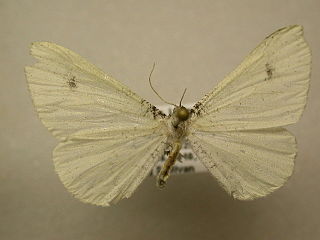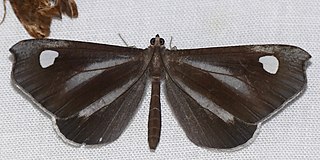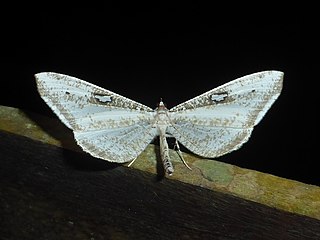
Theobroma grandiflorum, commonly known as cupuaçu, also spelled cupuassu, cupuazú, cupu assu, or copoazu, is a tropical rainforest tree related to cacao. Native and common throughout the Amazon basin, it is naturally cultivated in the jungles of north of Brazil, with the largest production in Pará, Amazonas and Amapá, Colombia, Bolivia and Peru. The pulp of the cupuaçu fruit is consumed throughout Central and South America, especially in the northern states of Brazil, and is used to make ice creams, snack bars, and other products.

Hedylidae, the "American moth-butterflies", is a family of insects in the order Lepidoptera, representing the superfamily Hedyloidea. They have traditionally been viewed as an extant sister group of the butterfly superfamily Papilionoidea, but a 2014 phylogenetic analyses has suggested Hedylidae is a subgroup of Papilionoidea, and not a sister group, and are more accurately referred to as butterflies rather than moths. They are represented by a single Neotropical genus Macrosoma with 35 currently recognized species.

Decapterus is a genus of marine fishes of jack family, Carangidae, commonly known as mackerel scads, round scads, or horse mackerel. They are found throughout the world.

Macrosoma albida is moth-like butterfly described by William Schaus in 1901. It belongs to the family Hedylidae. Originally it belonged to the genus Hyphedyle.
Macrosoma lamellifera is a moth-like butterfly in the family Hedylidae. It was described by Louis Beethoven Prout in 1916. It is hypothesized to be closely related to Macrosoma rubedinaria and Macrosoma ustrinaria, and though these groups fall within the same clade, they do not form a monophyletic group.

Macrosoma leucophasiata is a moth-like butterfly in the family Hedylidae. It was described by Paul Thierry-Mieg in 1904.

Macrosoma lucivittata is a moth-like butterfly in the family Hedylidae. It was described by Francis Walker in 1863.
Macrosoma minutipuncta is a moth-like butterfly in the family Hedylidae. It was described by Louis Beethoven Prout in 1916.
Macrosoma muscerdata is a moth-like butterfly in the family Hedylidae. It was described by Austrian entomologists Cajetan von Felder and Alois Friedrich Rogenhofer in 1875.
Macrosoma napiaria is a moth-like butterfly in the family Hedylidae. It was described by Achille Guenée in 1857.
Macrosoma nigrimacula is a moth-like butterfly in the family Hedylidae. It was described by William Warren in 1897.
Macrosoma paularia is a moth-like butterfly in the family Hedylidae. It was described by William Schaus in 1901.
Macrosoma pectinogyna is a moth-like butterfly in the family Hedylidae. It was described by Malcolm J. Scoble in 1990.
Macrosoma satellitiata is a moth-like butterfly in the family Hedylidae. It was described by Achille Guenée in 1857.
Macrosoma semiermis is a moth-like butterfly in the family Hedylidae. It was described by Louis Beethoven Prout in 1932.
Macrosoma stabilinota is a moth-like butterfly in the family Hedylidae. It was described by Louis Beethoven Prout in 1932.
Macrosoma subornata is a moth-like butterfly in the family Hedylidae. It was described by William Warren in 1904.

Macrosoma tipulata is a moth-like butterfly in the family Hedylidae. It was described by Jacob Hübner in 1818.
Macrosoma uniformis is a moth-like butterfly in the family Hedylidae. It was described by William Warren in 1904.
Macrosoma ustrinaria is a moth-like butterfly in the family Hedylidae. It was described by Gottlieb August Wilhelm Herrich-Schäffer in 1854.







